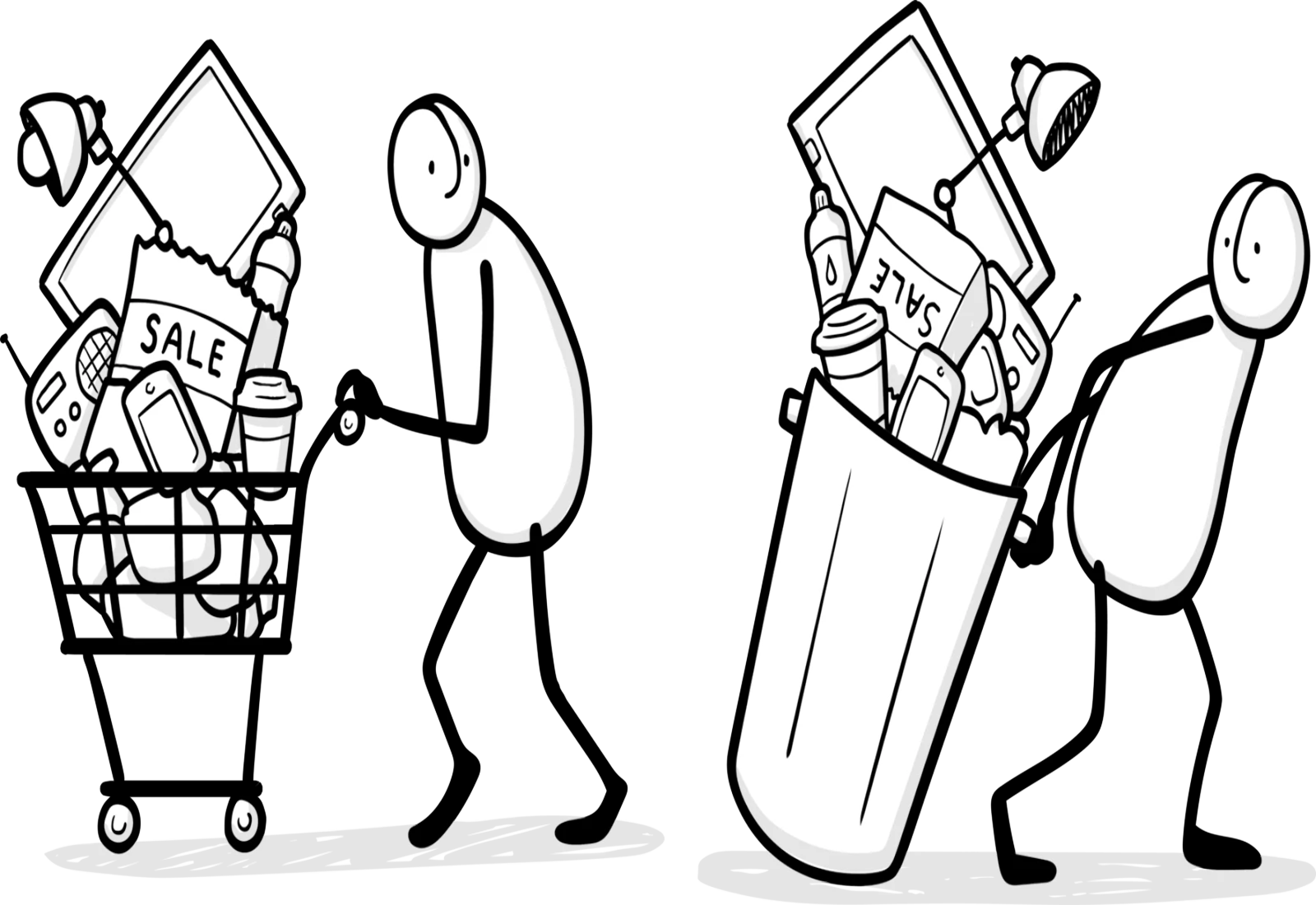We live in a consumer-driven society where we’re constantly surrounded by pressure to buy the latest products and “keep up with the Jones’s”.
We’ve all experienced the feeling of wanting…, and then buying something we don’t need.
This phenomenon is known as impulse buying and can lead to financial stress, clutter in our homes, and clutter in our life… all with out us even realizing it.
In this article, we will explore the reasons why people engage in impulse buying, the impact it has on our lives, and ways to break the cycle of buying things we don’t need.
We will also discuss the influence of advertising and social media on our (sub-conscious) purchasing decisions, the psychology behind why we buy things we don’t need, and the tactics retailers use to entice us to make impulse purchases.
Whether you’re struggling with impulse buying or simply curious about the subject, this article will provide valuable insights and practical tips.
“We Buy Things We Don’t Need, With Money We Don’t Have, To Impress People We Don’t Like.”
― Dave Ramsey
Why Do We Buy Anything At All ?
Maslow’s theory of motivation provides deep insight into why people generally buy things at all.
Dr. Abraham Maslow (1908-1970), was an esteemed psychologist who discovered the human desire to meet basic needs, creates a “”innate pressures”” (or motivation) that influences our daily actions and behavior.
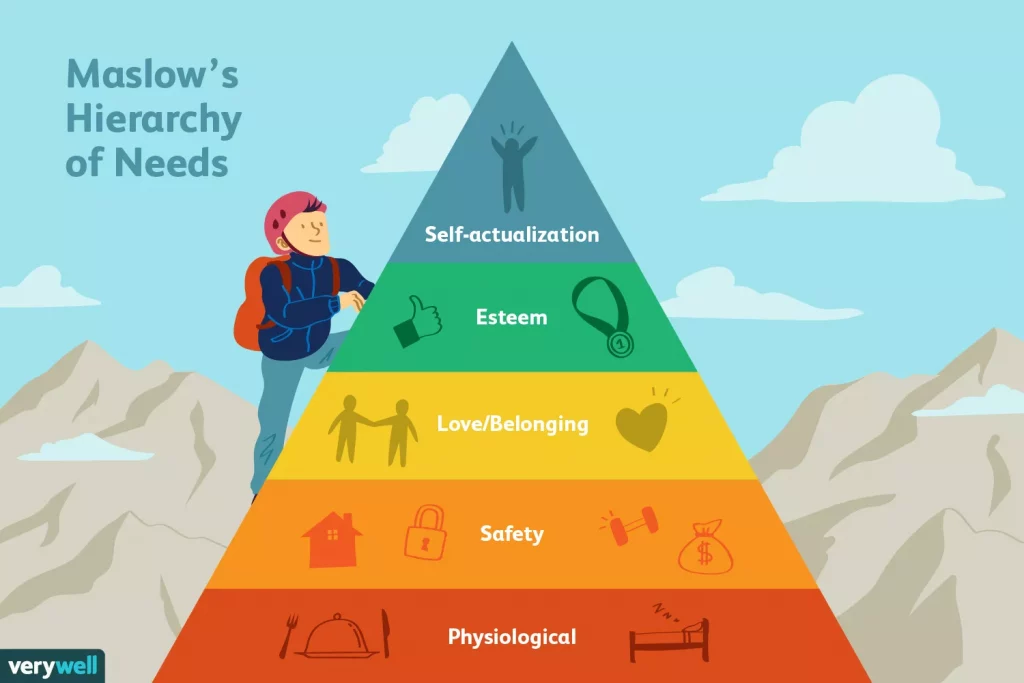
According to Maslow’s famous “needs pyramid”, people have basic physiological needs such as food, water, and shelter, which must be met before an individual can move up the pyramid to the next level of needs.
At the basic level of survival people buy things to fulfill their primary fundamental physiological needs.
Once basic physiological needs are met, people will look to meet their next level safety needs, such as security and protection.
People buy things like insurance, locks, cameras, guns, and alarm systems to meet these needs.
After safety needs are met, Maslow suggests that people will seek to advance up the pyramid to fulfill their belonging and love needs. For example prioritizing purchases on social interactions and companionship.
People buy things like cars, clothes, electronic devices, and pets to meet those needs.
When these needs are not met, this is where people can fall victim to addictive behaviors.
The next level is esteem needs, which includes the need for self-esteem and respect. People buy luxury items to show their perceived hierarchy and high-end technology to meet those needs.
Lastly, self-actualization needs, which is the need to reach one’s full potential and self-fulfillment. People invest in things like education, their community, and personal growth.
Maslow’s theory can help us understand the reasoning and psychology behind why we act the way we do to meet basic needs and desires as we move through the different levels of the pyramid.
The Psychology Behind Why We Shop For Things We Don’t Need
Everyone will justify their purchases with their own personal reasons.

Some may be more valid than others but Dr. Regan A. R. Gurung, Ph.D., Director of General Psychology at Oregon State University states that one of the most significant reasons is that shopping makes us feel good.
“At the heart of it all, stuff makes us feel good, and we all love feeling good. Many human behaviors are rewarded with pleasurable feelings (caused by the chemical dopamine). Buying stuff can release those same pleasure chemicals, and for many of us, our natural addiction to feeling good can hence be easily satisfied by buying something.”
— Regan A. R. Gurung, Ph.D.
Another interesting angle on why we buy things that we don’t need comes from the French philosopher Denis Diderot and what is now known as the Diderot Effect.
The Diderot Effect explains why we buy things we don’t need by describing the psychological process that occurs when we acquire a new possession.
When we purchase something new, it can create a sense of excitement and satisfaction. However, this satisfaction is usually short-lived. This can lead to a desire to acquire more items to complement the new possession, creating a cycle of consumption.
The more possessions we acquire, the more we feel the need to acquire more to make everything fit together and create a cohesive image of ourselves. This can lead to buying things we don’t need and may even lead to feelings of dissatisfaction as we continue to acquire more possessions to try and fill a void.
Other Reasons We Buy Things We Don’t Need
Media Influence/Social Media
We might not like to admit it to ourselves, but media plays a significant (and sometime sub-conscious) role in influencing us to buy things.
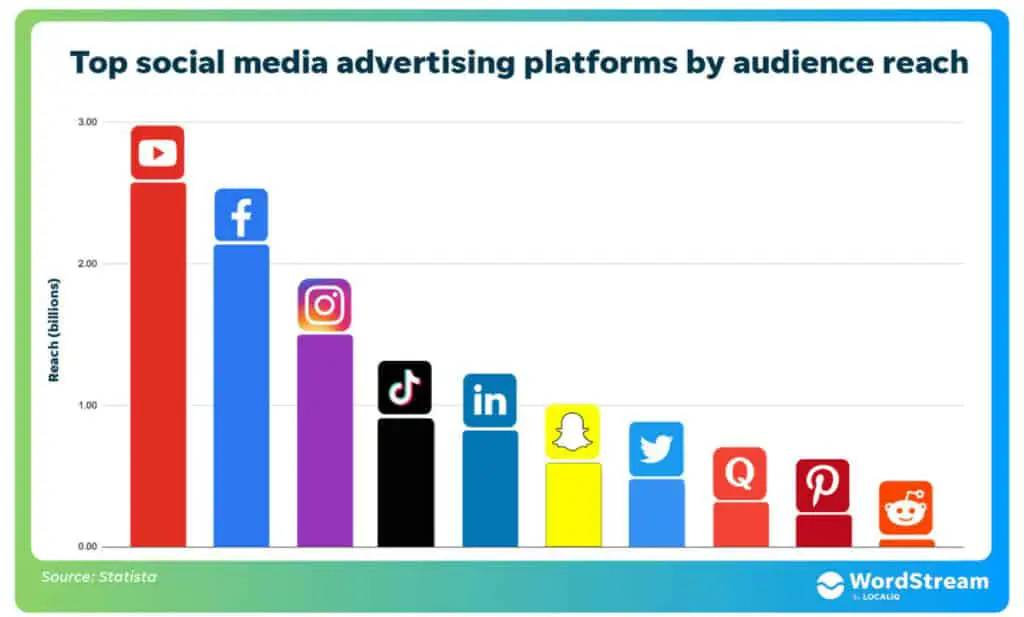
Through advertising, social media, and influencer marketing, media creates a sense of desire for products and services, even if we don’t necessarily need them. Advertisements use persuasive language and imagery to appeal to our emotions and desires, making us “want” to buy things that we really don’t “need”.
News media, social media platforms, and influencers are financially incentivized and make large profits when they get people to buy things. To further amplify this effect, online data is used for targeting ads and promoting products to specific demographics, making it easy for companies to reach their desired purchasing audience.
Social Pressure
Social pressure can make us buy things we don’t through peer pressure. We may feel that we need to conform to the expectations of our friends or family, which can lead to buying things we don’t need in order to fit in or be accepted. We may also feel pressure to buy things we don’t need in order to impress others or be viewed positively.

Social pressure can also come from marketers and advertisers, who often use social cues in their advertising. They may show images of happy people using a product, or depict people in a certain lifestyle to appeal to our desire to fit in or be like others.
This can also stem from influencers and celebrities, who are often seen as role models (which can sometimes lead to Celebrity Worship Syndrome). They promote products and services, and their followers may feel pressure to buy them in order to be like their idols.
Lack of Self-Control / Self-Discipline
Many of us have a lack of self-discipline and control when it comes to impulse buys. When we lack control, we may be more likely to make impulsive purchases without considering whether or not we actually “need” the item or just want it.
According to clinical psychologist Dr. Jane R. Burka, Impulsive buying behavior is often a result of a lack of self-control and self-regulation. When individuals are unable to regulate their emotions and impulses, they may turn to shopping as a way to cope with an emotion.
Depression / Boredom
According to Dr. Elizabeth Hartney, BSc, MSc, MA, PhD,
“shopping addiction is a behavioral addiction that involves compulsive buying as a way to feel good and avoid negative feelings, such as anxiety and depression. Like other behavioral addictions, shopping addiction can take over as a preoccupation that leads to problems in other areas of your life”

Depression and boredom can lead to buying things we don’t need in several ways.
One of the main ways is through emotional regulation. When people are feeling depressed or bored, they may turn to shopping as a way to cope with or distract from these negative emotions.
Shopping can provide a temporary sense of relief, but it doesn’t address the underlying issues and can lead to more negative consequences in the long run.
When people are feeling depressed or bored, they may have a lack of interest in other activities, leading them to seek out new things to do. This may lead to buying things they don’t need as a way to find new activities or to make themselves feel better.
A depressed state of mind can lead to buying things we don’t need is through a lack of self-esteem and self-worth. People who are feeling depressed or bored may have a low self-esteem and self-worth, which can lead them to buy things they don’t need to boost their self-esteem or to feel better about themselves.
Attaching Self-identity to Possessions
When we attach our self-identity to possessions, we may feel that we need certain items in order to define ourselves.
For example, if we believe that owning a certain type of car or clothing brand is necessary for our self-identity, we may feel pressure to purchase these items even if we don’t need them.
People with inflated ego’s often buy flashy items, luxury cars, and designer brands to show off their perceived elevated status.
This can lead to spending money on things we don’t need, or can’t afford, just to maintain our self-identity.
It’s important to note that while possessions can be a source of pleasure and can enhance our self-esteem, when we attach our self-identity to them, they can become a source of stress and dissatisfaction.
It’s important to have a balance and not to let possessions define who we are.
“Self-identity is the key to understanding the person you are and the person you want to be. It is the foundation of personal growth and the driving force behind behavior change.” – Dr. Carl Rogers, American psychologist
How To Avoid Impulse Shopping / Buying
7 Ways To Help Overcome The Tendency to Buy and Consume
1. Make a List
Before you go shopping, make a list of the things you need. This will help you stay focused on what you need and prevent you from buying things you only “want”.
2. Ask Yourself…, Is It Necessary
Before making a purchase, ask yourself if the item is necessary or if you can live without it. If you can live without it, it’s a want not a need.

3. Consider the Cost
Consider the cost of the item and whether or not you can afford it. If you can’t afford it, it’s probably a want.
4. Think About the Long-term
Consider the long-term value of the item. Will it be useful to you for a long time or is it just a passing trend?
5. Take a Break
If you’re feeling impulsive, take a break and come back to the item later. This will give you time to think about whether you really need it or not.
6. Reflect on Your Emotions:
Take a moment to reflect on your emotions and think about why you want to buy the item. Are you buying it to satisfy a temporary emotional need or is it something you truly need?
7. Set a Budget:
Set a budget for yourself and stick to it. This will help you limit your spending and ensure you only buy what you need.
How Ads Convince You To Buy Things ?
Dr. Martin Lindstrom, branding expert and author said it best, “We are susceptible to advertising because it plays on our deepest desires, fears, and insecurities. Advertisers are experts at manipulating our emotions and convincing us to buy things we don’t need.”
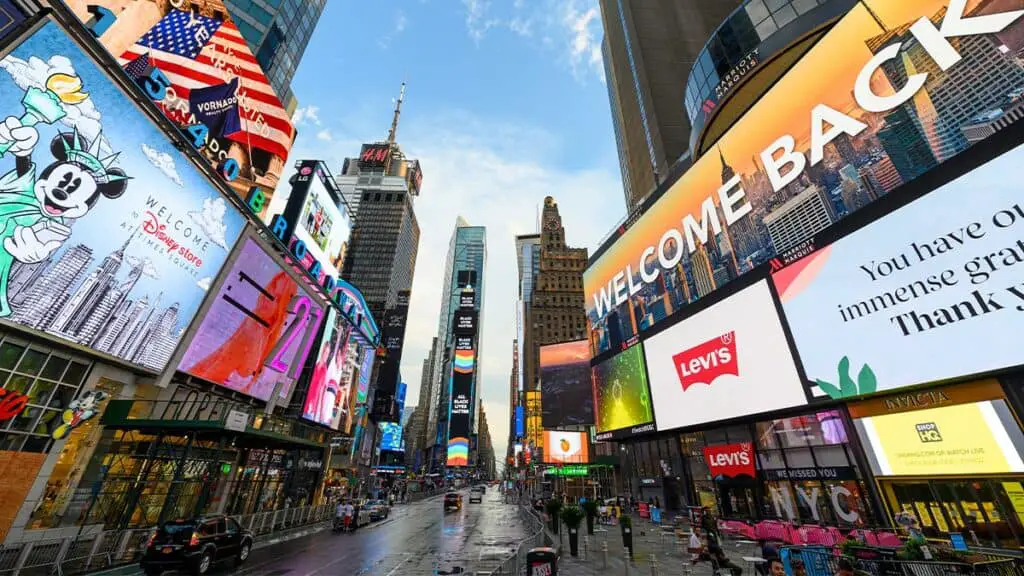
Marketing For Consumerism
Marketing is the process of promoting and selling a product or service. It is a key aspect of consumerism, which is the consumption of goods and services on a large scale.
Marketing plays a significant role in consumerism as it is used to create a demand for products and services, often through persuasive, sub-conscious, and manipulative tactics.
We all understand that everybody needs to make a living but at what point does marketing become “unethical” from a sales approach mass-marketing to consumers?
Companies may use false or misleading information in their advertising to make a product or service seem more desirable than it actually is. This can include exaggerating the benefits of a product, making false claims, or using deceptive images or videos.
Another sad aspect of this game is when we see large corporations and companies target vulnerable populations, such as children, the elderly, or low-income individuals, with manipulative marketing tactics that exploit their vulnerabilities.
In a sense they are raising false hope with a superhero cape on one hand while reaching under the table for your pockets with the other.
Ads Use Our Emotions To Get Us To Buy Things we Don’t Need
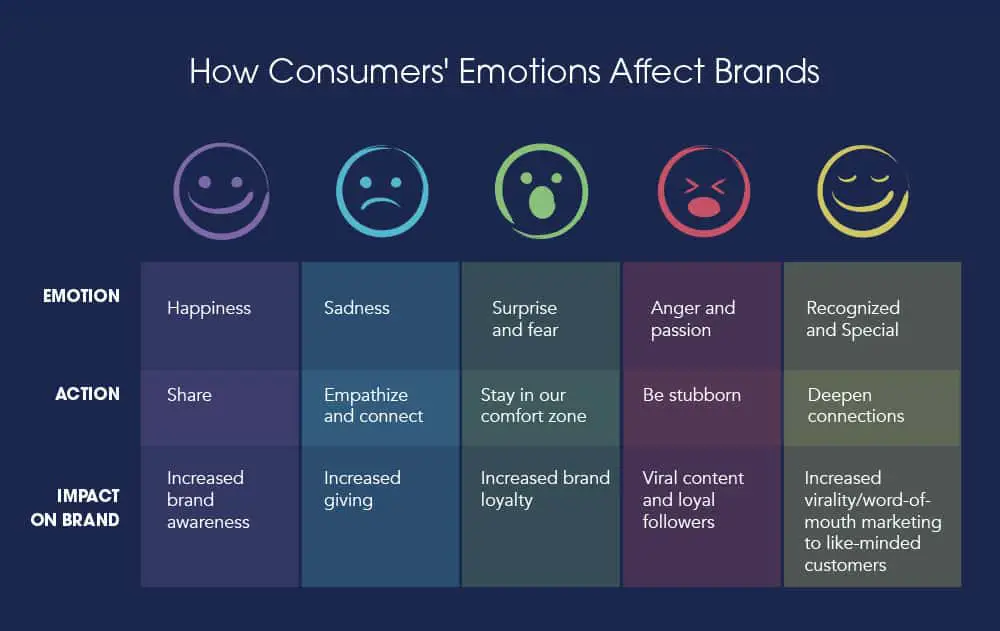
Sex Sells
“sex sells” is the most common phrase you’ll probably ever hear in the marketing world.
That’s because it’s used in so many different ways to manipulate the buyer. Media advertisements use sexually suggestive language or explicit images in their advertising to catch the attention of the viewer and create a desire for the product or service.
It can even go as low an unnoticed as using a sexualized atmosphere in their advertising, such as a dimly lit room, to create a sense of sensuality and desire.
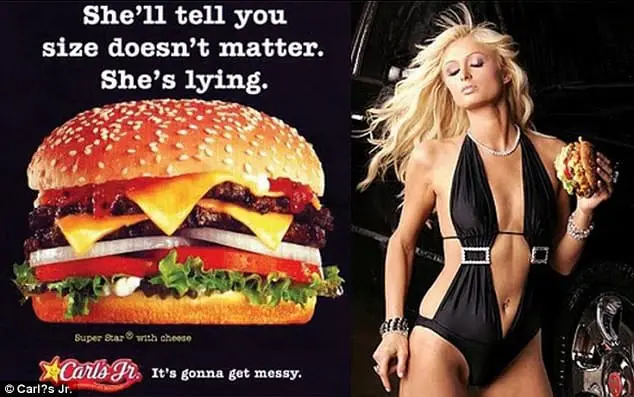
Fun Sells
Advertisers use “fun” as a way to market by incorporating elements of enjoyment, entertainment, and pleasure in their advertising and branding to create a positive association with their product or service. This tactis makes products more desirable and memorable to consumers.
Humor also works well getting shoppers to focus on experiences, create a sense of community or adventure, and evoke positive memories and emotions associated with the product.
Easy Sells
The concept of “easy” can be used as a way to market products by promoting (or exagetating) the simplicity and convenience of their product or service in their advertising and branding. This technique appeals to consumers’ desire for a more effortless and stress-free life (and laziness).
They may use phrases such as “easy to use”, “effortless”, “convenient” or “quick” to create an association with their product or service, making it more appealing to consumers.
Anger Sells
Playing on emotions such as frustration and dissatisfaction is another ways advertisers market their product / service as a solution to an anger evoking problem.
They may use negative emotions such as anger, frustration, and dissatisfaction in their advertising to create a sense of urgency and to position their product as a solution to a problem, thereby making it more appealing to consumers.
If you’re making a purchase based on anger, stop and think if you’re being manipulated by media.
Fear Sells
Fear and anger are both great tools used by politician form all sides to get their constituents to vote for them.

Fear, anxiety, or insecurities are yet another “unethical” way to create a sense of urgency and to position their product or service as a solution to a problem.
Marketers use fear-based language, imagery, or scenarios in their advertising to create a sense of danger or risk and to make their product or service appear essential in order to mitigate that risk.
One of the most famous tricks used is creating a sense of FOMO (fear of missing out) by promoting the latest trends and lifestyles, making us feel like we need to keep up with others, leading to buying things we don’t need.
Media also creates a sense of urgency by promoting limited time offers and limited stock availability, pushing us to make impulsive buying decisions that we later regret.
Popular Sells
The desire to be popular. Another selling point for marketers to lean on. You’ll see phrases such as “everyone’s doing it”, “trending” or “popular” to create an association with their product or service, making it more appealing to consumers by creating a sense of inclusion and social pressure to conform.
In political circles, populism is used to manipulate what is popular and what is true.
Final Thoughts: Why We Buy Things We Don’t Need
Shopping gives us the freedom of choice and sometimes when we don’t feel in control of our own lives, the freedom of choice and excitement of buying can be welcome feelings.
But when we buy things we don’t need, we could be falling victim to ourselves and re-inforcing negative behaviors in ourselves.
We buy things we don’t need for a lot of reasons, but by leveraging self-awareness and self-discipline we can at least me more aware of why we’re making the decisions that we are.
Be on the lookout for what you really need, and what’s just another product with a sexy mask being marketed to you for profit.
Loved what you read?
Hit that share button and let the world in on the secret – we’d be thrilled!
Got thoughts? We’re all ears for your feedback, corrections, or a good old chat. Don’t be shy; drop us a line.
And hey, don’t miss out on our curated list of must-reads in the recommended books section.
Big thanks for diving in with us today!


